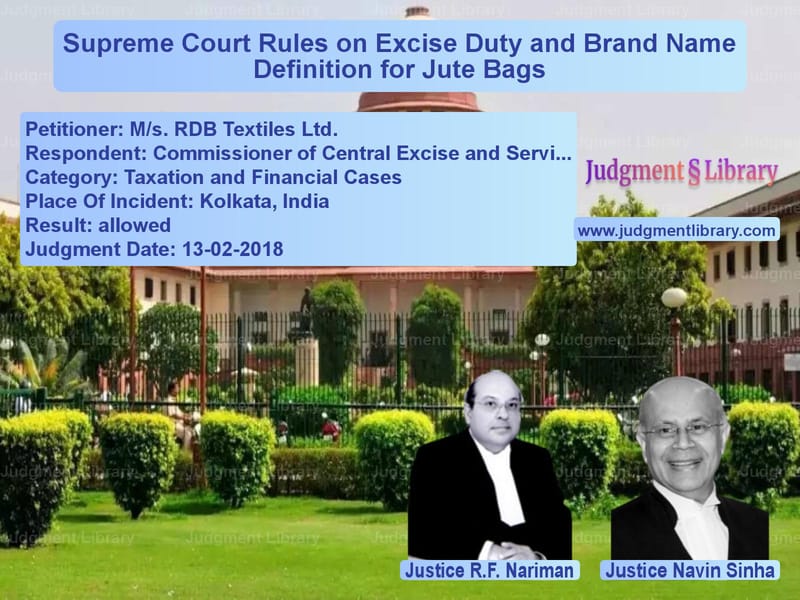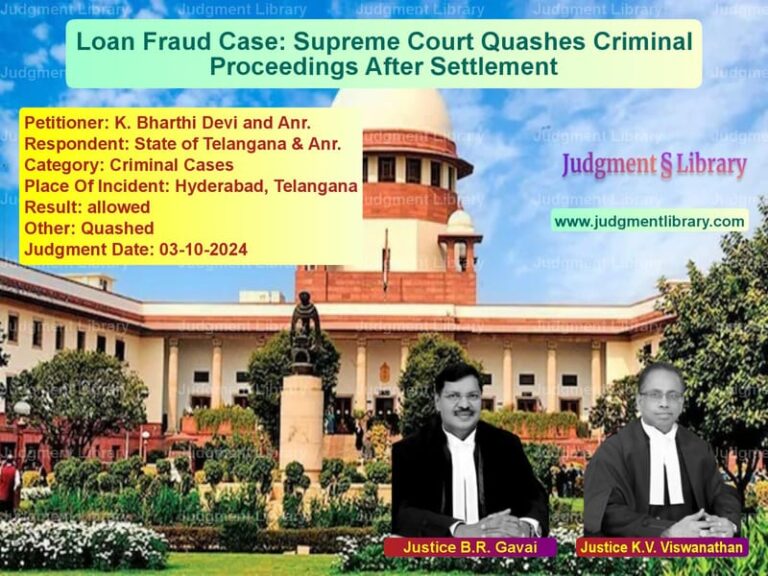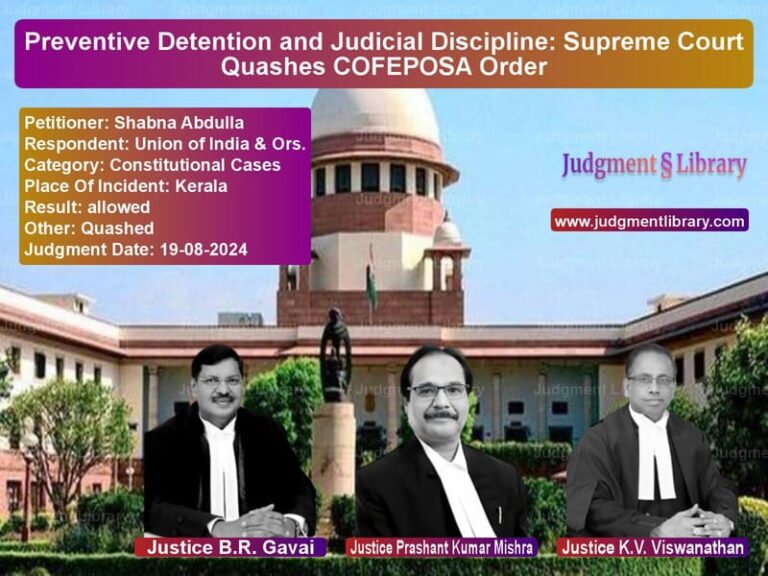Supreme Court Rules on Excise Duty and Brand Name Definition for Jute Bags
The Supreme Court of India delivered a significant judgment in the case of M/s. RDB Textiles Ltd. vs. Commissioner of Central Excise and Service Tax, Kolkata-IV, concerning the imposition of excise duty on jute bags supplied to the Food Corporation of India (FCI) and various state governments. The central issue in this case was whether the jute bags, which bore the names and emblems of governmental agencies, were considered branded goods under the Central Excise Act, 1944, and thus subject to excise duty.
Background of the Case
M/s. RDB Textiles Ltd. was involved in manufacturing jute bags, which were supplied to the FCI and other government agencies for packing food grains for the Public Distribution System (PDS). The company had sought exemption from excise duty under the Central Excise Act, 1944, claiming that the jute bags did not carry a ‘brand name’ as defined under the relevant provisions of the Act.
The appellants argued that the bags, although bearing the name of the purchaser (such as FCI) and other details (such as the year of manufacture), did not carry a ‘brand name’ within the meaning of the law. The Central Excise authorities, however, disagreed, asserting that the inclusion of the buyer’s name and other markings transformed the bags into branded goods, thus attracting excise duty.
Petitioners’ Arguments
M/s. RDB Textiles Ltd. argued that:
- The jute bags manufactured by them were marked with the names of the procurement agencies, such as FCI, and other required details like the crop year and manufacturing details, but not a brand name.
- The mere inclusion of the buyer’s name (FCI) did not qualify as a ‘brand name’ under the Central Excise Act, as the buyer’s name was used for identification purposes and not to indicate a connection in the course of trade between the product and some person using the name or mark.
- The Central Excise authorities were wrong to interpret the markings as a ‘brand name’ and levy excise duty on the goods.
Respondents’ Arguments
The Commissioner of Central Excise argued:
- The jute bags carried the name and emblem of the buyer (such as FCI) and were thus considered to bear a ‘brand name’ as per the definition under the Central Excise Act, 1944.
- The inclusion of such names or emblems could mislead consumers into thinking there was a connection between the bags and the buyer, which fell within the scope of a ‘brand name’.
- Even if the name was printed for identification purposes, it still met the legal criteria for being classified as a ‘brand name’.
- The Tribunal’s decision to uphold the imposition of excise duty on the jute bags was justified under the law.
Supreme Court’s Judgment
Definition of Brand Name
The Supreme Court focused on the definition of a ‘brand name’ as outlined under the Central Excise Act, 1944. The Court noted:
“A ‘brand name’ refers to any name, mark, logo, or symbol that is used in relation to a product to indicate a connection between the product and the person using that name or mark. It does not need to indicate the identity of the manufacturer but must suggest an association with the product in trade.”
Markings on Jute Bags
The Court agreed with the appellants that the markings on the jute bags did not qualify as a ‘brand name’. It observed:
“The names and emblems printed on the jute bags are done as per the requirement of government agencies for identification and control purposes. These markings are not intended to create a connection in the course of trade between the jute bag and a particular person, and therefore, they do not amount to a brand name.”
Implication of Exemption Notification
The Court also discussed the effect of the exemption notification under the Central Excise Act and noted that the bags were exempt from excise duty based on the nature of the markings. The Court stated:
“The exemption granted under the Central Excise Act applies to goods that do not bear a ‘brand name’ and are meant for public distribution purposes. As the jute bags in question are used solely for the packing of food grains for the PDS, they are exempt from excise duty.”
Dismissal of CESTAT’s Judgment
The Supreme Court found that the Customs, Excise and Service Tax Appellate Tribunal (CESTAT) had erred in interpreting the definition of ‘brand name’ and improperly upheld the excise duty imposition. The Court ruled:
“The CESTAT’s decision to classify the jute bags as ‘branded’ goods was incorrect. The markings on the bags do not fulfill the criteria for being a ‘brand name’. Therefore, the imposition of excise duty was unjustified.”
Key Takeaways from the Judgment
- Clear Definition of Brand Name: The ruling clarifies that the term ‘brand name’ applies only to names or marks used to indicate a connection in trade between a product and its manufacturer or seller, not just any marking or labeling.
- Government Agency Markings Do Not Constitute Brand Names: The Court affirmed that names and emblems used by government agencies for identification do not amount to a brand name if they are not intended to create a market association.
- Exemption from Excise Duty: The judgment emphasizes that goods meant for public distribution, such as jute bags used in the PDS, are exempt from excise duty when they do not bear a brand name.
- Correct Interpretation of Exemption Notifications: The Court stressed that excise duty should not be levied on goods that meet the criteria of the exemption notification, and the CESTAT’s ruling was incorrect in this regard.
Conclusion
The Supreme Court’s ruling in M/s. RDB Textiles Ltd. vs. Commissioner of Central Excise and Service Tax, Kolkata-IV reaffirms the importance of correctly interpreting ‘brand name’ in excise duty cases. The Court clarified that merely affixing the name of a buyer or emblem on a product does not automatically qualify as a brand name. The judgment protects the interests of manufacturers supplying goods for public distribution and ensures that they are not unjustly burdened with excise duties.
Petitioner Name: M/s. RDB Textiles Ltd.Respondent Name: Commissioner of Central Excise and Service Tax, Kolkata-IVJudgment By: Justice R.F. Nariman, Justice Navin SinhaJudgment Date: 13-02-2018
Don’t miss out on the full details! Download the complete judgment in PDF format below and gain valuable insights instantly!
Download Judgment: Ms. RDB Textiles Lt vs Commissioner of Cent Supreme Court of India Judgment Dated 13-02-2018.pdf
Direct Downlaod Judgment: Direct downlaod this Judgment
See all petitions in Income Tax Disputes
See all petitions in Commercial Insurance Disputes
See all petitions in Corporate Compliance
See all petitions in Judgment by Rohinton Fali Nariman
See all petitions in Judgment by Navin Sinha
See all petitions in allowed
See all petitions in supreme court of India judgments February 2018
See all petitions in 2018 judgments
See all posts in Taxation and Financial Cases Category
See all allowed petitions in Taxation and Financial Cases Category
See all Dismissed petitions in Taxation and Financial Cases Category
See all partially allowed petitions in Taxation and Financial Cases Category







